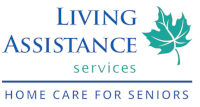Senior care involves the skills of different types of caregivers. Many people don’t know the different qualifications of the various types of caregivers and what they offer.
The following is an overview of each type of caregiver employed by Living Assistance Services and what they do for our clients.
Caregiver
Our caregivers have at least two years of Canadian experience working in home care or with the elderly population. They provide a number of home care services related to day-to-day living, including:
Personal care, such as bathing, grooming, and dressing
Light housekeeping, such as washing dishes, changing bedding, vacuuming, etc.
Meal planning and preparation
Shopping and errands, such as medical appointments, dining out, and church
Convalescence and respite care, providing visits as needed to give family members a break from caregiving
Companionship, which includes assisting with day-to-day activities, crafts, reading, playing cards, and other activities to help combat senior loneliness
Personal Support Worker (PSW)
Our personal support workers have successfully completed the Ontario PSW Training Program through an accredited college or not-for-profit organization.
Our PSWs, who must have a minimum of two years of work experience, have the training and experience to take on a number of home healthcare responsibilities. In addition to the services provided by caregivers, PSWs also:
- Check and record vitals, including blood pressure, temperature, and pulse
- Assists other members of the healthcare team if the client is hospitalized, such as mobilization and physical lifts
- Collects urine, stool, and sputum samples
- Assists the care recipient with monitoring blood glucose levels
- Assists with range of motion exercises and other duties related to rehabilitation
- Observes and reports behavioral changes, medication side effects, changes in existing conditions
- Provides the care recipient and their family with emotional and social support services
- Provides supportive care at end of life
- Registered Practical Nurse (RPN)
All RPNs practicing in Ontario are members of the College of Nurses of Ontario (CNO). To meet the requirements for registration, they must be a graduate from a college diploma program in practical nursing from a college approved by the College of Nurses of Ontario.
Our RPNs work under the direct supervision of a Registered Nurse (RN) and provide various medical and home healthcare services to patients who are medically stable, including:
- Wound care
- Administering medications, such as injections, oxygen, and oral and topical medications
- Personal medical care, such as nail trimming and foot care, and oral cavity suctioning
- Ostomy and catheter care
- Post-operative care
- Registered Nurse (RN)
An RN undergoes longer and more complex training than an RPN. All RNs in Ontario must have either a baccalaureate obtained through collaborative college-university nursing program or a four-year university nursing program. RNs are trained to look after people with medically complex needs whose condition is unpredictable.
David Porter, CPCA
Director
Living Assistance Services – Senior Home Care

